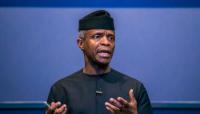Nigeria pivots toward new engines of growth

Vice president Yemi Osinbajo believes Nigeria’s business reforms and recent signing of the African Continental Free Trade Agreement will diversify investments.
Five African countries – Djibouti, Kenya, Nigeria, Togo, and Zimbabwe – emerged as top improvers in the World Bank’s 2020 Doing Business rankings. Nigeria makes the cut thanks to business-centered reforms ranging from an e-payment system at federal ports, which speeds up imports and exports, to an electronic payment platform that harmonises the tax authority with the company registration authority.
In July, Nigeria signed onto the African Continental Free Trade Agreement, entering the largest trading bloc since the creation of the World Trade Organisation.
Building on this momentum, the country is working to diversify its economy by attracting investments in the renewable energy, technology and agriculture sectors, among others.
“We are in the process of diversifying our economy,” vice-president Yemi Osinbajo told investors at this month’s Nordic-African Business Summit roundtable. “This has opened up prospects in infrastructure especially roads, rail and power.”
Prompted by falling oil prices, Nigeria’s government has searched for pathways to diversification for more than four years. Data from fDi Markets shows that the number of recent FDI projects into Nigeria increased by 49% in 2018, with inward capital investment increasing by 58%.
Agriculture
In recent years, Nigeria has attracted agriculture investments as part of the government’s bid to move toward self-sufficiency in food production. “Investments in various agricultural value chains have gone up,” Mr Osinbajo said . “[We] have doubled the paddy rice production in the past three years.“ Investors boosting these efforts include Wacot Group, whose rice mill investments in Nigeria aim to create 3500 jobs and 120,000 metric tonnes per annum. Dangote is likewise investing $1bn in Nigeria’s rice production.
Addressing a cattle-grazing crisis which has sparked violence and inflamed ethnic tensions in the country, Mr Osinbajo talked about the ambitious National Livestock Transformation Plan (NLTP). The programme offers a roadmap to modernise livestock production. To create two points of entry for investors, NLTP operates as a partnership between Nigeria’s federal and state governments.
Investors contributing to modernising Nigeria's dairy and meat processing industry include Singapore’s Olam group, which invested in poultry feed mills that generate 720,000 metric tonnes per annum. Meanwhile, Denmark’s Arla has invested about N7.65bn ($21m) in grazing reserves through a loan-equity arrangement with the state government.
Renewables and technology
More than 60 million households still lack power, said Mr Osinbajo, adding that renewable energy investments to develop off-grid capacity and micro-grids promise to accelerate progress. Through “willing-buyer, willing-seller agreements”, he explained, private sector solar power facilities now provide power to almost 50,000 retailers in Kano’s Sabon Gari marketplace, and beyond.
Mr Osinbajo asserted that investors can further expand digital infrastructure to underserved areas, and profit from Nigeria’s famous relationship with technology adoption, shown by an 86% penetration rate for mobile phones.
Photo credit: Tolani Alli

Global greenfield investment trends
Crossborder investment monitor
|
|
fDi Markets is the only online database tracking crossborder greenfield investment covering all sectors and countries worldwide. It provides real-time monitoring of investment projects, capital investment and job creation with powerful tools to track and profile companies investing overseas.
Corporate location benchmarking tool
fDi Benchmark is the only online tool to benchmark the competitiveness of countries and cities in over 50 sectors. Its comprehensive location data series covers the main cost and quality competitiveness indicators for over 300 locations around the world.
Research report
fDi Intelligence provides customised reports and data research which deliver vital business intelligence to corporations, investment promotion agencies, economic development organisations, consulting firms and research institutions.
Find out more.




